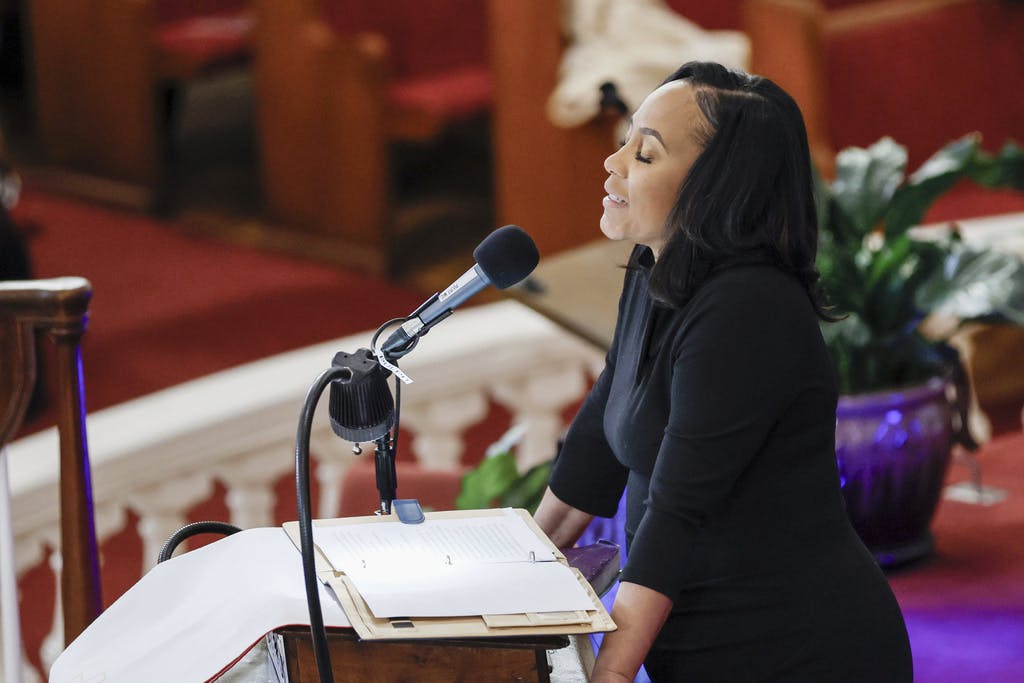Besieged Fani Willis, Though Disqualified, Scores a Rare Victory Over New Panel Created To Curb Power of Prosecutors
The commission denies an open records request directed at her office.

The victory secured by the district attorney of Georgia’s Fulton County, Fani Willis, over an independent committee created by her political foes is a rare bright spot during a challenging time for the beleaguered and disqualified prosecutor.
The Prosecuting Attorneys Qualifications Commission, which was created by Peach State lawmakers to rein in “rogue prosecutors,” rejected an open-records complaint from a California press personality, Gregory Mantell. The commission’s executive director determined that “there is not sufficient evidence to meet the clear and convincing standard that DA Willis personally directed noncompliance with the Georgia Open Records Act.”
Ms. Willis has been peppered with records requests from interest groups, journalists, and lawmakers who want to know about whether she coordinated her prosecution of President Trump with the Biden administration, Special Counsel Jack Smith, or the Democrat-controlled congressional January 6 committee. Ms. Willis has denied coordinating with the White House and refused to hand over records related to Mr. Smith.
Courts have twice found Ms. Willis to have violated Georgia’s open-records laws, and ordered her office to pay some $75,000 in fees for her recalcitrance in fulfilling those requests. Those suits were brought by Judicial Watch and one of her defendants. One judge has even held out the possibility that Ms. Willis’s responsiveness to demands for information has been so deficient that an independent monitor could be appointed to ensure compliance.
The commission, which was signed into law by Governor Kemp, is empowered to “investigate alleged misconduct of district attorneys and solicitors-general” and claims jurisdiction over “every elected or appointed district attorney and solicitor-general regarding allegations of misconduct and allegations of incapacity.” It began operating last year after Georgia’s supreme court initially expressed skepticism as to its constitutionality. The law was redrafted to exclude high court review.
Consideration from Georgia’s highest court, which is discretionary rather than mandatory, is precisely what Ms. Willis is seeking after her disqualification from the racketeering case she brought against Mr. Trump and 18 others for election interference. The blow against the district attorney was delivered by a two-to-one vote of the Georgia court of appeals.
That court determined that this is “the rare case in which disqualification is mandated and no other remedy will suffice to restore public confidence in the integrity of these proceedings.” The remedy was required because of the secret romance Ms. Willis conducted with her handpicked special prosecutor, Nathan Wade. Her office paid Mr. Wade, who has never led a felony prosecution, some $650,000 for his work on the case.
Ms. Willis and Mr. Wade also took vacations together to destinations like Belize, Aruba, and Napa Valley. Cellular telephone records adduced by her defendants show thousands of calls exchanged between the two prior to him joining Ms. Willis’s office, though the two testified under oath that their affair — which Mr. Wade called “as American as apple pie” — only began after he was hired. The court of appeals did not credit that account.
The trial judge who initially heard the disqualification motion, Scott McAfee, determined that the behavior of the prosecutorial pair emitted an “odor of mendacity” and was “legally improper,” but ruled that if Mr. Wade departed from the case Ms. Willis could stay on to lead it. He was reversed when the appellate judges found that insufficient to cure the defect in the case caused by the relationship.
A lawyer, Harvey Silverglate, for one of the defendants in the case, John Eastman, tells the Sun that he believes that the case’s complicated structure — racketeering cases are more complex than their simpler relatives, conspiracy charges — was driven by Ms. Willis’s intention to create more billable hours for Mr. Wade. The court of appeals appears to feel the same way, reckoning that the relationship affected Ms. Willis’s prosecutorial “discretion.”
In the open-records complaint, though, the commission found, “There is not sufficient evidence that DA Willis knowingly authorized or permitted an assistant district attorney to refuse to comply with or provide false replies to open records requests.” Mr. Mantell is seeking documents related to Ms. Willis’s travel expenses and her office’s communications with the Department of Justice with respect to federal grant money.
Ms. Willis is separately facing investigations from both the Georgia senate and the federal House of Representatives. Georgia’s supreme court elected last week to hear Ms. Willis’s challenge to a subpoena issued to her by Peach State lawmakers seeking her testimony on the foundering prosecution of Mr. Trump.
Mr. Mantell is the author of “Special Victims Status: The Era of Woke Journalism.” A conservative commentator, Anne Coulter, hails it as the “most amazing book of the year. … The best book I’ve ever read.”

